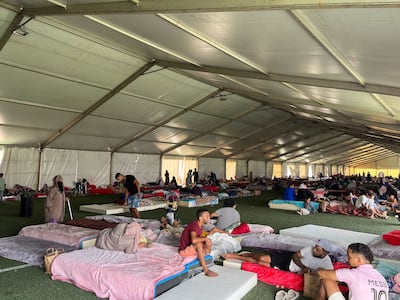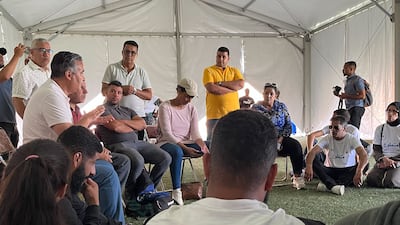Authorities in Morocco have started setting up shelters for those who lost their homes in the 6.8-magnitude earthquake that hit Marrakesh on Friday, killing almost 3,000 people and disrupting the lives of more than 300,000.
At the 20 Ghosht Sports Complex in the Marrakesh city centre, two large tents have been set up to bring in families whose homes in the historic old Medina were destroyed.
Among those is Khadija Laarousi and her family. After the earthquake, parts of her two-level home fell apart.
They now have nowhere else to go.
Ms Laarousi lived in the house with her disabled husband, her daughter and her son and his family of four.
“I have no words to describe that day. I wanted to save my husband but he screamed at me and told me to just save myself but I could not,” she told The National as she sat on a mattress in the tent where new survivors were taking shelter.
Even after having the door fall on her, she continued to yell for help until people outside managed to drag her husband to safety.
The experience left Ms Laarousi’s big family with no safe place to go.
Today, after spending a few nights sleeping in the street and in the city's narrow alleyways, they finally received a more comfortable place to rest.
“I was finally able to sleep yesterday [Monday night],” she said. “I felt at ease.”
Ms Laarousi said the police came and brought her to the shelter, together with her husband – whom they gave a wheelchair – and gave them food and other necessities.
However, she still hopes for a better solution.
“I am thankful that I now have a place to protect us from the daytime sun and the cold at night but I really hope we could find another house of our own soon,” she said.
“I really do not want much. I just want a place where I can die in comfort.”

The newly set up shelter has a capacity of 1,000 people – impressive for a makeshift structure but it is a drop in the ocean amid the vast crisis.
Many survivors were queuing on Tuesday at the Sports Complex entrance, waiting for a spot to become available in one of the tents.
“Several people from the old Marrakesh Medina had to leave their homes after the earthquake and had nowhere to go, we could not leave them all sleeping in the public square so the setting up of this shelter is best solution that we could provide at this moment,” Ismaeel Chaaouf, Marrakesh city council member, told The National.
Mr Chaaouf said that besides providing a place to sleep for the victims, they also have daily meals delivered and have a team from the Moroccan Red Crescent that comes during health emergencies.
“We know that this might not be enough as we are still at the peak of the crisis but we have to do whatever we can to alleviate that burden,” he said.
More than 60 volunteers are currently working round the clock to manage the Marrakesh Sports Complex shelter. It needs constant attention, as it houses many children.
“We are all one family, we are not just neighbours,” Rashid, a volunteer at the shelter, told The National.
“We feel the loss of these people as our own … If a family member goes through a catastrophe, it is only natural to offer a hand.”
He is especially aware of the impact of the earthquake on children and how their lives were turned upside down overnight.
“Finding themselves in a shelter all of a sudden is something these children will not understand … We [volunteers] try to do our best to make them feel that there has not been much change,” Rashid said.
However, finding a place to sleep is only the beginning of a survivor's healing. The process will be slow and painful.
Ms Laarousi's grandson has nightmares and flashbacks to the disaster, even after finding safety.
“My 12-year-old boy starts screaming every night at the exact same time the quake happened that night,” Ms Laarousi's daughter-in-law, Soumaya, told The National.
“He is a child and finding himself overnight in such a situation, it is hard to fathom.”


